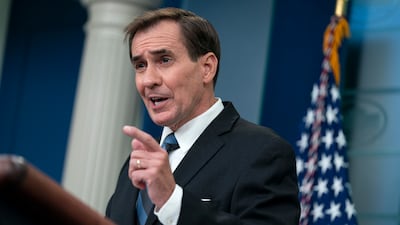President Joe Biden's administration voiced cautious optimism on Wednesday about a revival of the Iran nuclear deal, and said it is closely co-ordinating with Israel following a call between the US leader and Israeli Prime Minister Yair Lapid.
National Security Council spokesman John Kirby said Washington remains “hopeful” about reaching an agreement on the revival of the Joint Comprehensive Plan of Action (JCPOA), which was signed in 2015 between world powers and Iran.
The US optimism is due to Iran removing some of its conditions for returning to the nuclear deal, the White House said.
These include dropping the demand to delist the Islamic Revolutionary Guard Corps from the US list of foreign terrorist organisations as well as the demand for the International Atomic Energy Agency to close an investigation into traces of uranium found at three undeclared nuclear sites.
Mr Kirby said Washington is waiting for Iran’s feedback on its response, which was delivered via the European Union last week.
“We still remain hopeful that we can get to the reimplementation of the JCPOA; we do believe we're closer now than we had been in certain recent weeks and months,” the US official said.
Asked about Iranian Foreign Minister Hossein Amirabdollahian's comments in Moscow on Tuesday in which he requested more US guarantees on the return to the deal, Mr Kirby said Washington is committed to the JCPOA framework.
“I don't know what guarantees he is talking about. We have been negotiating in good faith from the very beginning,” Mr Kirby said.
He reiterated that the US remains both cautiously optimistic and pragmatic in its approach in trying to close the remaining gaps in the negotiations.
Washington is also closely consulting with its regional partners on the issue.
On Tuesday, Mr Lapid announced that he had discussed the Iran talks in a call with Mr Biden.
“We talked at length about the negotiations between the powers regarding the nuclear agreement, and the various efforts to stop Iran's progress towards nuclear weapons,” the Israeli prime minister said.
Mr Biden "underscored US commitment to never allow Iran to acquire a nuclear weapon" in his phone call with Mr Lapid, the White House said in a readout.
Last week, Israel’s Defence Minister Benny Gantz and the country’s National Security Adviser Eyal Hulata visited Washington to discuss the concessions Iran is seeking as well as US security commitment to Israel.
The head of the Israeli intelligence agency Mossad, David Barnea, was expected to arrive in the US this week for further talks on any possible deal, Axios reported.
Ali Vaez, the director of the Iran project at the International Crisis Group, said the fate of the nuclear deal remains unclear.
“It’s always one step forward, one step back,” Mr Vaez told The National.
Right now, the success of any negotiations will depend on Iran’s answer to US comments following the EU proposal.
“A clean 'yes' will result in a deal. A 'yes, but' is likely to prolong the process until after” the US midterm elections in November, he added.


